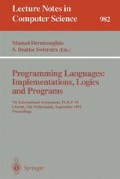Abstract
We propose a goal-directed query processing method for disjunctive logic databases. The notion of “relevancy” proposed in a theorem prover called SATCHMORE in [LRW95] is useful for the satisfiability checking of a given set of clauses, but it is not sufficient for the query processing in disjunctive databases, where it is essential in some applications for the answer to a given query to be distinguished between “true”, “false”, or “unknown (possibly true)”.
We first give a goal-directed query processing procedure based on the relevancy, but suitably modified for the above purpose, and show that our procedure is sound and complete for a class of positive disjunctive databases in the minimal model semantics. We then show that a modified version of our procedure effectively works as a correct query processing method for the possible model semantics [SI93], a recently proposed alternative semantics for disjunctive databases. We also show some experimental results of the procedure.
Preview
Unable to display preview. Download preview PDF.
References
Baral, C. and Gelfond, M., Logic Programming and Knowledge Representation, in J. of Logic Programming vol. 19/20:73–148 (1994).
Bancilhon, F. and Ramakrishnan. R., An Amateur's Introduction to Recursive Query Processing Strategies, Proc. of ACM SIGMOD Intl. Conf. on Management of Data, pp.16–52, 1986.
Fujita, M. Slaney, J. and Bennet, F., Automatic Generation of Some Results in Finite Algebra, Proc. of IJCAI93, pp.52–57, 1993.
Grant, J. and Minker, J., Answering Queries in Indefinite Database and the Null Value Problem, in: Advance in Computing Theory 3, The Theory of Databases, P. Kanellakis(ed.), JAI Press, Greenwich:247–267, 1986.
Hensen, L. and Prak, H., Compiling the GCWA in Indefinite Deductive Database, in: Foundations of Deductive Database and Logic Programming, Morgen Kaufmann, 1988.
Inoue, K., Koshimura, M. and Hasegawa, R. Embedding Negation as Failure into a Model Generation Theorem Prover, Proc. of 11th Int'l Conf. on Automated Deduction, 1992.
Kato, S., Seki, H. and Itoh, H. An Efficient Abductive Reasoning System Based on Program Analysis, Proc. of the 3rd Int'l WSA, LNCS, Vol.724: 230–241, 1993.
Kowalski, R., Logic Programming in Artificial Intelligence, Proc. of IJCAI'91: 596–603, 1991.
Loveland, D. W., Reed, D. D. and Willson, D. S., SATCHMORE: SATCHMO with RElevancy, J. of Automated Reasoning, 14: 325–351 (1995).
Lobo, J., Minker, J. and Rajaseker, A., Foundations of Disjunctive Logic Programming, MIT Press, 1992.
Manthey, R. and Bry, F., SATCHMO: a theorem prover implemented in Prolog, Proc. of CADE'88, 1987.
Fujita, H. and Hasegawa, R., A Model Generation Theorem Prover in KL1 using Ramified Stack Algorithm, Proc. of ICLP'91, pp. 535–548, 1991.
Minker, J., On Indefinite Data Bases and the Closed World Assumption, Proc. 6th Int. Conf. on Automated Deduction, Lecture Notes in Computer Science 138, Springer-Verlag: 292–308, 1982.
Minker, J. and Rajasekar, A. A fixpoint semantics for disjunctive logic programs. J. of Logic Programming, Vol. 9, No. 1: 45–74 (1990).
Ross, K. A. and Topor, R. W., Inferring Negative Infomation from Disjunctive Databases, J. of Automated Reasoning 4: 397–424 (1988).
Rajaseker, A., Lobo, J. and Minker, J., Weak Generalized Closed World Assumption, J. of Automated Reasoning 5, 293–307. (1990)
Ramsay, A., Generated Relevant Models, J. of Automated Reasoning 7: 359–368 (1991).
Sakama, C. and Inoue, K., Negation in Disjunctive Logic Programs, Proc. of ICLP'93, pp. 703–719 (1993)
Sakama, C. and Inoue, K., On the Equivalence between Disjunctive and Abductive Logic Program, Proc. of ICLP'94, 1994.
Yahya, A. and Henschen, L.J., Deduction in Non-Horn Databases, J. of Automated Reasoning 1 (2): 141–160 (1993).
Author information
Authors and Affiliations
Editor information
Rights and permissions
Copyright information
© 1995 Springer-Verlag Berlin Heidelberg
About this paper
Cite this paper
Shimajiri, Y., Seki, H., Itoh, H. (1995). Goal-directed query processing in disjunctive logic databases. In: Hermenegildo, M., Swierstra, S.D. (eds) Programming Languages: Implementations, Logics and Programs. PLILP 1995. Lecture Notes in Computer Science, vol 982. Springer, Berlin, Heidelberg. https://doi.org/10.1007/BFb0026833
Download citation
DOI: https://doi.org/10.1007/BFb0026833
Published:
Publisher Name: Springer, Berlin, Heidelberg
Print ISBN: 978-3-540-60359-7
Online ISBN: 978-3-540-45048-1
eBook Packages: Springer Book Archive

